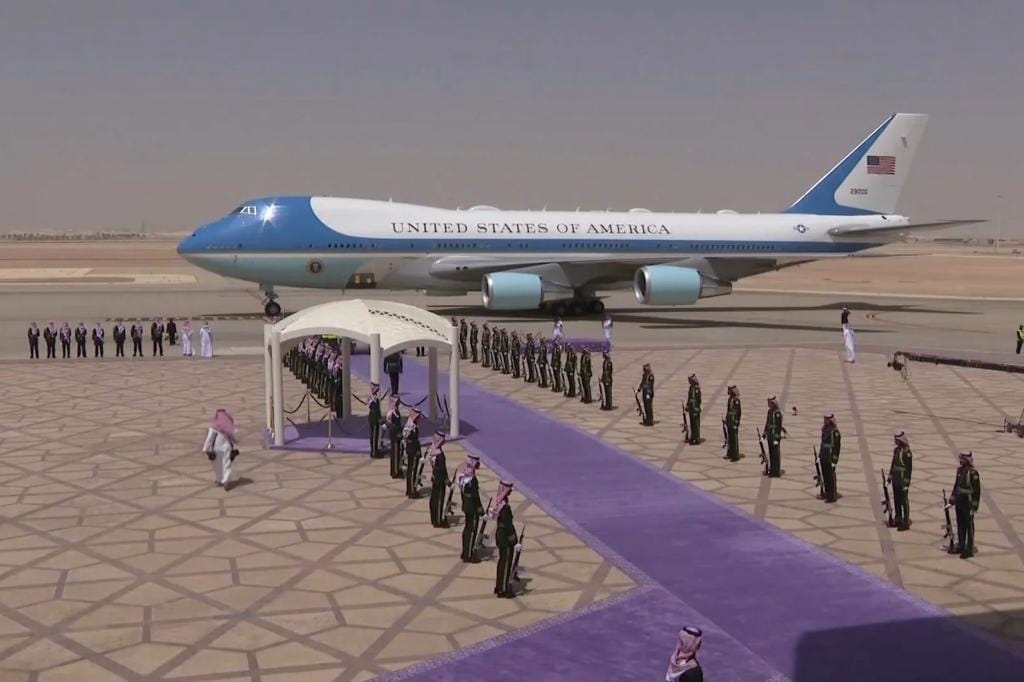May 13 2025
GOP Tax Plan Unveiled; Trump in Riyadh; US Travel Spending Declines; Trump on Qatar Jet Gift; China "Electrostate" Status

GOP Unveils Tax Plan: Extends Trump Cuts, Slashes Green Incentives, Targets University Endowments
Trump Arrives in Riyadh: "America First" Diplomacy Kicks Off With Saudi Deals Focus
Welcome Mat Rolled Up? U.S. Faces $12.5 Billion Decline in International Travel Spending This Year
Trump on Qatar Jet Gift: "When They Give You a Putt, You Say Thank You"
China Powers Towards "Electrostate" Status, Shifting Global Energy Landscape
GET THE CITIZEN JOURNAL APP - FREE!
1. GOP Unveils Tax Plan: Extends Trump Cuts, Slashes Green Incentives, Targets University Endowments
WASHINGTON—House Republicans unveiled a tax plan that raises the state-and-local tax deduction, ends some taxes on tipped income and overtime pay and extends President Trump’s expiring 2017 tax cuts, partially paid for by rolling back tax breaks for electric cars and clean-energy production.1 The text released by the House Ways and Means Committee on Monday details how Republicans are trying to fulfill Trump’s campaign-trail promises and shows where they want to raise taxes to cover part of the cost. It fires the starting gun on a breakneck two weeks of negotiations in the House, as Republicans split over budget deficits, energy policy, healthcare and taxes try to wrangle a majority for the plan. Here are some [abridged] highlights of the proposal:
Electric vehicles. The credit for purchasing new electric vehicles would end Dec. 31… Credits for commercial EVs and used EVs would end after 2025.2
Clean-energy breaks. Credits for producing renewable energy or investing in it would start shrinking in 2029 and be eliminated after 2031.3
Manufacturing tax breaks. Tax credits for producing components for batteries and renewable energy would generally expire after 2031, with expiration after 2027 for wind-energy components.
Carried interest and sports teams. The tax treatment of private-equity managers’ carried-interest income wouldn’t change, even though Trump wanted to do so. Deductions associated with purchasing sports teams would be limited, fulfilling that Trump request.
Executive pay. There are some new limits on companies’ ability to deduct compensation above $1 million.
Universities and foundations. Some universities would pay an annual tax of up to 21% on their annual net investment income in endowments, up from 1.4% today.4 Foundations would pay up to 10%, up from 1.39% today.
No tax on tips and overtime. These tax breaks would start in 2025 and expire after 2028. The tips break is written so that it may be claimed by people who work as independent contractors, such as Uber drivers.
MAGA accounts. A new tax-preferred savings account for children—“money account for growth and advancement”—would be created and funded with $1,000 for citizens born from 2025 through 2028.5
Car loan interest deduction. A new break sought by Trump would provide a deduction for car loan interest, even to people who don’t itemize deductions.
Senior deduction. People aged 65 and older would get an additional $4,000 standard deduction, on top of the existing standard deduction
Private schools and home schooling. A new tax credit worth up to 10% of a taxpayer’s income would match donations to scholarship-granting organizations. That would effectively let people direct some of their federal tax dollars to fund K-12 educational costs, including for private and religious schools and home schooling.
WSJ
2. Trump Arrives in Riyadh: "America First" Diplomacy Kicks Off With Saudi Deals Focus
RIYADH, Saudi Arabia—President Trump arrived in Saudi Arabia to begin a four-day Middle East visit that will put the cold calculus of “America First” on full display: Invest great sums of cash into the U.S. economy and get a more engaged Washington in return.6 Trump’s first stop in Riyadh kicked off with a Saudi F-15 escort as Air Force One touched down at King Khalid International Airport on Tuesday.7 Drums boomed and horns blared as Saudi Crown Prince Mohammed bin Salman, the country’s de facto ruler, greeted Trump on a lavender-colored carpet rolled out beneath the American plane.8
WSJ
Good morning from Air Force One, Saudi Arabia! Thank you for the escort, and having President Trump’s back—We all appreciate it. See you on the ground shortly, THANK YOU!!!🇺🇸🇸🇦 pic.twitter.com/iGuqfCvnwt
— Dan Scavino (@Scavino47) May 13, 2025
3. Welcome Mat Rolled Up? U.S. Faces $12.5 Billion Decline in International Travel Spending This Year
The U.S. welcome mat is rolling up — at least that’s how some international travelers see it, according to the World Travel & Tourism Council, a global organization representing the travel and tourism industry.9 And the cost for that hospitality lapse will be high. The United States is on track to lose $12.5 billion in international travel spending this year, falling to less than $169 billion from $181 billion in 2024, according to the latest Economic Impact Research, published by the W.T.T.C. on Tuesday.10 That’s a 22.5 percent decline from the U.S. international spending peak of $217.4 billion in 2019.
NYT
4. Trump on Qatar Jet Gift: "When They Give You a Putt, You Say Thank You"
This is the parable of the president and the putt. It was Monday morning in Washington and President Trump was in the Roosevelt Room of the White House, signing one more executive order before departing for his expedition to the Middle East.11 Over the weekend, news had broken about his plan to accept a $400 million plane from Qatar to use as Air Force One.12 Questions abounded. This luxurious gift from the Qataris presented all sorts of concerns — ethical, legal, logistical, mechanical.13 Even some of his dearest supporters were concerned. “We cannot accept a $400 million ‘gift’ from jihadists in suits,” Laura Loomer, a far-right activist Mr. Trump was having none of it.14 “They’re giving us a free jet,” he said. “I could say, ‘No, no, no, don’t give us, I want to pay you a billion, or $400 million,’ or whatever it is. Or, I could say, ‘Thank you very much.’” “There was an old golfer named Sam Snead,” he said. “Did you ever hear of him?” Old Sam Snead “had a motto,” Mr. Trump continued. “When they give you a putt, you say, ‘Thank you very much.’ You pick up your ball, and you walk to the next hole. A lot of people are stupid. They say, ‘No, no, I insist on putting it.’ Then they putt it, they miss it, and their partner gets angry at them.” “Remember that,” Mr. Trump said. Some of his aides nodded appreciatively at this most Trumpian pearl of wisdom that was being dispensed. “Sam Snead,” he repeated. “When they give you a putt, you pick it up and you walk to the next hole and you say, ‘Thank you very much.’” It was a bit of a stretch, comparing a gimme in golf to accepting a luxury jet from a foreign government.
NYT
5. China Powers Towards "Electrostate" Status, Shifting Global Energy Landscape
When Xi Jinping took over the leadership of the Chinese Communist party in late 2012 he quickly identified a national security vulnerability. China had just leapfrogged Japan to become the world’s second-biggest economy and was fast becoming America’s chief rival nuclear-armed superpower. But the country of 1.4bn people was highly dependent on foreign nations for energy. Reliance on oil and coal imports had surged to record highs, exposing China to potential supply disruptions via chokepoints in trade channels from the disputed waters of the Taiwan Strait and the South China Sea to the Strait of Malacca and the Indian Ocean.15 Today, as the world is rocked by Donald Trump’s trade war, the view from the CCP’s leadership compound in Beijing’s Zhongnanhai is starkly different. China is on its way to becoming the world’s first “electrostate”, with a growing share of its energy coming from electricity and an economy increasingly driven by clean technologies.16 It offers China a strategic buffer from trade decoupling and rising geopolitical tensions with the US. The country is not only rapidly advancing towards self-sufficiency in energy from secure domestic sources, but also wields vast power over the markets for the resources and materials that underpin technologies of the future. Earlier industrial revolutions were led first by the UK and then by the US, including the so-called information age more recently. But it is China that now leads the latest global technology revolution in electrification and renewable energy, say analysts from US-based energy think-tank RMI and other independent research groups.17 And just as oil and gas drives a petrostate’s economy, clean energy technologies are making a significant contribution to Chinese growth.18 This has been particularly welcome for Beijing in the context of a slowing economy. Clean energy sectors accounted for a record 10 per cent of the country’s GDP and drove a quarter of its growth last year, according to analysis of official government statistics by the Helsinki-based Centre for Research on Energy and Clean Air.19
FT
May 13, 1846: U.S. Congress declares war on Mexico
SUBSCRIBE ONLINE TO GET THE US CITIZEN JOURNAL IN YOUR INBOX - FREE!
App update: subscribe to notifications
Eliminate unwanted notifications

See the Ad Astra Podcast! Released on Apple and Spotify around 10a CST.
Sponsors (click me!)





Sources
- https://www.wsj.com/politics/policy/republican-tax-plan-boosts-salt-deduction-ends-green-energy-breaks-57bc922c?mod=hp_lead_pos9
- https://www.wsj.com/world/middle-east/trump-kicks-off-middle-east-swing-built-around-deals-50fdf84b?mod=hp_lead_pos1
- https://www.nytimes.com/2025/05/13/travel/united-states-international-visitors-decline.html
- https://www.nytimes.com/2025/05/12/us/politics/trump-sam-snead-qatar-plane.html
- https://www.ft.com/content/f86782fa-9f2e-448a-b710-29e787dc9831

